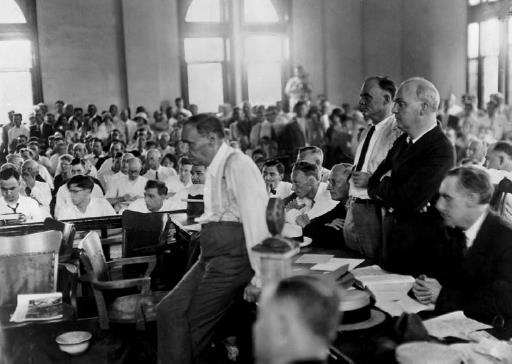Law and Famous TrialsScopes Monkey Trial |
What was the “monkey trial”? |
The July 1925 trial of Dayton, Tennessee, public schoolteacher John T. Scopes (1900–1970) was dubbed the “monkey trial” because at issue was Scopes’s teaching of evolution in his classroom. Having yielded to religious beliefs in creationism (the story of human origins told in the Bible’s book of Genesis), Tennessee state law prohibited teaching public school students about the theories of English naturalist Charles Darwin (1809–1882). Darwin’s scientifically credible work The Origin of Species argued that humans had descended from apelike creatures. Celebrated attorney Clarence Dar-row (1857–1938) defended Scopes; lawyer and former presidential candidate William Jennings Bryan (1860–1925), known as the “Great Commoner,” argued the prosecution. For 12 days in the summer of 1925, the small town in eastern Tennessee became the site of a showdown between modern scientific thought and traditional fundamentalism, or as some observed, between cosmopolitan and rural America. Spectators crowded the courtroom, eventually forcing the proceedings to be moved to the courthouse lawn. Journalists issued daily reports, which were published in newspapers across the country. It was headline writers who dubbed the case the “monkey trial.”
Darrow made history when he called Bryan himself to the stand; it was a daring move on the defense attorney’s part, but since Bryan eagerly accepted the summons, the judge allowed the questioning. Darrow first got Bryan to agree that every word in the Bible is true; then he set in to reveal the hazards of such a literal interpretation, asking, for example, how Cain had found himself a wife if he, Adam, Eve, and Abel were the only four people on Earth at the time. Darrow succeeded in shaking the prosecutor, who finally admitted that he did not believe Earth was made in six days. Bryan retaliated by accusing Darrow of insulting the Bible, to which Darrow replied, “I am examining you on your fool ideas that no Christian on earth believes.” It was drama better than any novelist could write. Darrow lost the case, which was later overturned on a technicality. Scopes had only been charged a $100 fine for violating the state law, which was repealed in 1967. But the trial, preserved in the play and film Inherit the Wind, is still remembered today: Scopes’s crime was not sensational, his trial did not break any legal ground, and the defense had not won a brilliant victory, but the proceedings, carried out in the midsummer heat of the American South, epitomized the era and, ultimately, made for a great story.

